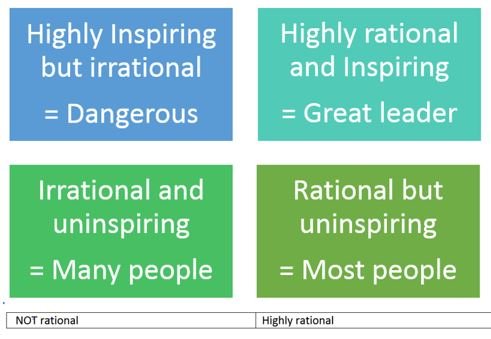Why are Some People Dangerous?
Why are Some People Dangerous?
Everyone thinks and everyone communicates.
- Everyone thinks, but people use varying degrees of logical rationality, ranging from low to high levels.
- Everyone communicates, but people communicate in ways that make them more or less inspirational.
These two characteristics; "rationality" and "inspirational communication skills", suggest four categories of people: The Best, the Most, the Many and the Dangerous!
The Best
The Best occurs when both these positive attributes are combined in the same people.
The result is a group of people who are logically rational AND are highly communicative, persuasive and inspiring. These are the great leaders, of whom Martin Luther King would be a terrific example.
The Most
Most of us are not great leaders. Most people are rational, but NOT gifted with amazing communication skills and powers of persuasion. But we live our lives according to rational principles, or at least we try to.
The Many
Sadly, there are a lot of people who fall into the category of "behaving irrationally and having poor communication skills". These people generally fail in life because they fail to do the right things, or even do the wrong thing. They don't communicate well, they lack motivation and a few turn to crime.
The Dangerous
The dangerous people are those who look and sound good, and are highly effective speakers, but their ideas are irrational. Their policies are based on a set of ill-defined terms, vague assumptions, illogical conclusions, obvious contradictions and faulty statistics. This in turn produces a non-sensical, dangerous philosophy, which they then expertly communicate to the Most and the Many.
Houston, we have a problem!
Members of "the Dangerous" can easily be mistaken for being members of "the Best".
The Most and the Many are likely to be duped by the Dangerous. The Dangerous person is believed to be one of the Best, mostly because of their persuasive linguistics. But simmering under the rhetoric, is a heap of self-contradictory, destructive and dangerous policies, that wreak havoc.
The most obvious example of the Dangerous but irrational speaker is Hitler, but I am sure you can think of more contemporary examples.
What are we to do with this information?

Whenever we are listening to the confident experts and politicians. We should take the contents of this grid into account.
We should ask ourselves, "Are we listening to the Best people speak, or rather the Dangerous?"
The logical test questions that we should apply to any speaker claiming to be an expert are these:
- Are they using ill-defined terms, dubious or hazy definitions?
- Is their whole case based upon unstated or vague assumptions?
- When put into practice, do their policies create obvious, glaring contradictions?
- Are the experts over-dependent on dubious statistics?
- Are their policies wreaking havoc amongst the Most and the Many?
If the answers to these questions is Yes, then we may NOT be listening to the Best people.
Definition: dangerous speaker
In public communication, a dangerous speaker is a speaker who sounds clear and inspiring yet builds the talk on weak logic, vague words and poor facts, hides big faults or conflicts in the plan, and pushes listeners to act in ways that harm themselves or others.
Show CG4D Definition
- Speaks with high confidence and inspiration
- Builds arguments on weak or illogical reasoning
- Uses vague terms, poor data and ignores contradictions
- Persuades listeners to accept actions or policies that cause harm
Article Summary
Great oratory hides risk when reason is weak; test every bold claim for clear terms, sound facts and logical flow, and you will spot dangerous speakers before their words mislead the crowd.
Frequently Asked Questions
Here are some questions that frequently get asked about this topic during our training sessions.
What makes someone a dangerous speaker?
What are the four types of people named in the grid?
Why is strong speech without sound logic risky?
How can I test if an expert's claim is solid?
Can inspiring but irrational leaders gain power easily?
What damage can irrational policies cause?
How do I guard against dangerous speakers?
Thought of something that's not been answered?
Did You Know: Key Statistics
Edelman Trust Barometer 2024 finds 61% of people around the world believe government and business leaders try to mislead them with false claims or weak facts. Ofcom Online Nation 2024 states 71% of UK adults say they saw misleading or harmful online content in the past seven days.Blogs by Email
Do you want to receive an email whenever we post a new blog? The blogs contain article 5-10 minutes long - ideal for reading during your coffee break!
Further Reading in Communication - Persuasive Communication
-
Communication Skills: Etiquette and Politeness
Learn the clear difference between etiquette and politeness, why respectful communication boosts trust, and simple steps to improve your social manners today.
Read Article > -
Good and Bad Speech Habits
Learn how speech habits sway your image and pay. Spot four common bad habits, swap in clear, polite language, and watch your career and workplace ties grow.
Read Article > -
Effective communication skills
Master effective communication through clear speech, open body language, sound logic and concise writing. Build trust, cut wasted hours and lift your career.
Read Article > -
Everything is Negotiable
Learn core negotiation skills: plan entry and exit points, trade concessions, stay logical, and keep a BATNA so you can walk away and still secure fair deals.
Read Article > -
Tips to Improve your communication skills
Learn how to improve communication skills fast. Listen more, ask clear questions and gain agreement to influence others while cutting costly errors at work.
Read Article >
Looking for Communication Skills Training?
If you're looking to develop your Persuasive Communication Skills, you may find this Communication Skills Training Course beneficial:
Open Training Course Pricing and Availability
Next Open Course Starts in 10 days, Manchester City, places available






